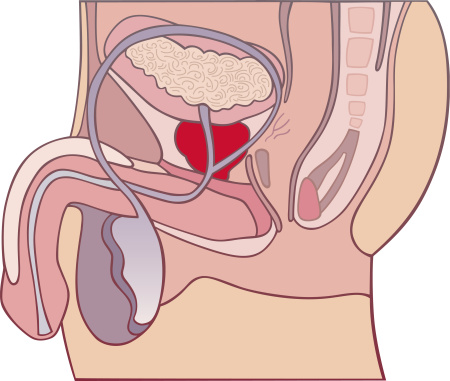Possible Link Found Between Prostate Cancer and STI

A team of scientists from the Argentina, Italy, and the United States has found a possible connection between the sexually-transmitted infection trichomoniasis and prostate cancer.
Trichomoniasis (sometimes called “trich”) is caused by a parasite called Trichomonas vaginalis.
The scientists discovered that this parasite secretes a protein that is very similar to a protein made by humans. These proteins can lead to inflammation of the prostate, which in turn can spur the growth of both normal prostate cells and cancerous ones.
The researchers suggested that if the parasite protein acts like the human protein, it might contribute to the growth of prostate cancer cells.
It’s important to note that these results do not mean that trichomoniasis causes prostate cancer or that prostate cancer is a sexually-transmitted disease. However, the findings might provide some clues for future research.
In an interview with the BBC, Nicola Smith of Cancer Research UK said, “This study suggests a possible way the parasite Trichomonas vaginalis could encourage prostate cancer cells to grow and develop more quickly.”
“But the research was only done in the lab, and previous evidence in patients failed to show a clear link between prostate cancer and this common sexually transmitted infection,” she added.
The Centers for Disease Control and Prevention (CDC) estimate that 3.7 million people in the United States have trichomoniasis. Women are more likely to be infected than men.
The parasite can be spread from the vagina to the penis and vice versa. It can also be transmitted from vagina to vagina.
About 70% of people with trichomoniasis have no symptoms and don’t know that they are infected.
Those that do have symptoms usually have genital itching and discomfort. Some have a discharge from the penis or the vagina and experience a burning sensation while urinating. (Men might have discomfort while ejaculating, too.) Symptoms do not always start right away; it might take several weeks for them to develop.
Trichomoniasis is easily treated with medication, but it can be caught again. Safer sex practices, like using condoms, can reduce the risk of infection.
Resources
BBC News
Roberts, Michelle
“Prostate cancer 'may be a sexually transmitted disease'”
(May 19, 2014)
http://www.bbc.com/news/health-27466853
Centers for Disease Control and Prevention
“Trichomoniasis - CDC Fact Sheet”
(Page last updated: August 3, 2012)
http://www.cdc.gov/STd/trichomonas/STDFact-Trichomoniasis.htm
LiveScience
Lallanilla, Marc
“Can a Common STD Cause Prostate Cancer?”
(May 20, 2014)
http://www.livescience.com/45743-sti-std-trichomoniasis-trich-prostate-cancer.html
NHS Choices
“Prostate cancer linked to common STI”
(May 21, 2014)
http://www.nhs.uk/news/2014/05May/Pages/Prostate-cancer-linked-to-common-STI.aspx
Proceedings of the National Academy of Sciences of the United States of America
Twu, Olivia, et al.
“Trichomonas vaginalis homolog of macrophage migration inhibitory factor induces prostate cell growth, invasiveness, and inflammatory responses”
(Full-text. Published online before print: May 19, 2014)
http://www.pnas.org/content/111/22/8179.full.pdf+html?sid=5dc7306d-d557-4fab-bf23-42410c164ba9
WebMD
Russell, Peter
“Prostate Cancer 'Could Be Transmitted Sexually'”
(May 23, 2014)
http://www.webmd.com/prostate-cancer/news/20140523/prostate-cancer-std
You may also be interested in...
Other Popular Articles

What Is the Average Penis Size?
If you have ever wondered how your penis compares to others in terms of size, you are not alone. Many men are curious to know how their penises stack up compared to the average. Unfortunately, general curiosity can sometimes give way to full-on obsession and anxiety about penis size. This can be an unhealthy and often unnecessary fixation, especially because most men who think their penises are too small have perfectly normal-sized penises.

What Is Jelqing, and Does It Actually Work?
The term “jelqing” refers to a set of penis stretching exercises that some believe can make the penis bigger. Although the practice has gained attention and popularity in blogs and internet forums in recent years, there is no scientific evidence that it is an effective way to permanently increase the size of one’s penis. In fact, in some cases, jelqing may actually cause damage to the penis, so it is a good idea to get all the facts before setting off to try it.

What Is Sensate Focus and How Does It Work?
Sensate focus is a technique used to improve intimacy and communication between partners around sex, reduce sexual performance anxiety, and shift away from ingrained, goal-oriented sexual patterns that may not be serving a couple.

Can Sex Reduce Menstrual Cramps?
The SMSNA periodically receives and publishes ‘guest editorials.’ The current article was submitted by Mia Barnes, a freelance writer and researcher who specializes in women's health, wellness, and healthy living. She is the Founder and Editor-in-Chief of Body+Mind Magazine.
Having sex while you experience menstrual cramps is healthy and can provide significant benefits. While it might not be the first activity that comes to mind when your PMS or period cramping begins, many people enjoy sex to reduce menstrual cramps, experience increased pleasure and benefit from other advantages. Learn more about having sex while menstrual cramps are happening and how it can help your body.

How Long Does It Take the Average Man to Ejaculate?
On average, it takes a man between 5 to 7 minutes to orgasm and ejaculate during sexual intercourse.

Can Sex Throw off Your Vaginal pH Balance?
The SMSNA periodically receives and publishes ‘guest editorials.’ The current article was submitted by Mia Barnes, a freelance writer and researcher who specializes in women's health, wellness, and healthy living. She is the Founder and Editor-in-Chief of Body+Mind Magazine.
Your vagina is a pretty powerful organ. It is a pathway for menstrual blood and babies. It also is a main player in sexual intercourse. You might hear about your vagina’s pH and worry that yours is at risk. Here’s what to know about vaginal pH, including the impacts sex could have.
You are prohibited from using or uploading content you accessed through this website into external applications, bots, software, or websites, including those using artificial intelligence technologies and infrastructure, including deep learning, machine learning and large language models and generative AI.

